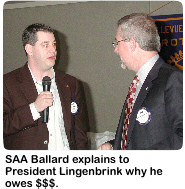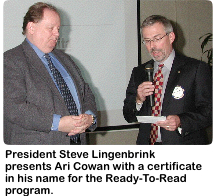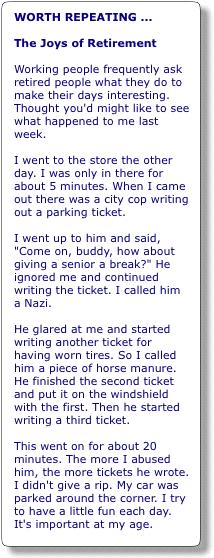|
||||||||||||||
Vol. 18, No. 42, APRIL 17, 2006 |
||||||||||||||
The Friday Program:
Ari Cowan (he explained that Ari is a Celtic name and his family removed the “Mc” from “McCowan” when they immigrated to America) is Founder and President of Edvita Institute in Bellevue. Established in April 2001, the Institute produces assessment instruments, professional development programs, curricula (and other education tools), and advisory services to help people meet the challenges in their lives. Many of these materials are delivered via the internet and on compact disc. Edvita offerings focus on life skills and human effectiveness with a special emphasis on meeting the challenge of the pandemic of violence. President Lingenbrink opened the meeting, noting it was Good Friday, and “the season of miracles. The Clippers have made the playoffs!” New member Elena Howell gave the invocation and led the pledge to the flag. Another new member, Corr Pearce, had an Easter question in store for each of four visiting Rotarians.
Steve Roberts has traded in his old classification of “Distribution-Fasteners” to “Homeless Agency Guy” as he transitions into his post-work passion. “For a decade now, I have been working with a group of churches sponsoring a shelter for single men on the Eastside. Two years ago, I became operations manager for the shelter project which moves from church to church. At this point, I sold my company and devoted my time to Congregations for the Homeless as Executive Director.” Steve said he’d led the organization in adopting a new mission statement which now reads “providing a warm, safe place of shelter ensuring the transition of a homeless man to a stable life.” After ten years helping to operate a shelter, we found that these men did not have the skills to make it on their own. “It was counter-productive to shelter them without giving them tools to become productive citizens. Now, our organization is connecting with Hopelink for a coaching program for the men we serve. The need for programs like ours is growing. There are 200-300 homeless families living on the Eastside. We’re operating a 30-bed shelter for single men, providing medical aid, haircuts, showers, life coaching and transitional housing.” Congregations for the Homeless have studied where transitional housing is located on the Eastside. There are 575 units for families but only 6 for single adults. Steve said his group is working with King County, cities, and the state and will have new 25 units ready by the end of the year. “It’s been an exciting ride,” Steve concluded.
• • •
• • •
“Our ROAR program is working well ... several members have used the conduit of Rat on a Rotarian, revealing such costly items as Jan Nestler getting noticed by the media, but no mention of Rotary — $5.00.” Terry Peterson announced his good news of him stepping into the President and COO job at Charter Bank. After a hefty round of applause for Terry, Ballard tried to dig for a proper fine, since the Rotary pin was nowhere in sight in the article in the paper. “So, Terry, how many branches does your bank have?” Answer: Four. “How many employees do you have?” Answer, 52. “How much is the current assets under management?” Answer: $252,000,000 (Is that enough zeroes?). Then, to everyone’s surprise, Terry produced an old “Get Out of Jail Card,” issued by and Old Sergeant At Arms, who happened to be Steve Lingenbrink! Peterson got away without a fine, but Lingenbrink had to pay up! $100! And, of course, Frank Young, our visiting Closet Member, was jealous and rose to match Lingenbrink’s fine. That’s $200! Jeff Maxwell was seen prominently on Channel 5 giving tax advice. Again, no Rotary pin. Someone else chimed in they’d seen him on Channel 4, and another on Channel 7. Jeff agreed to pay $100 to the Rotary Foundation and $50 to the BBRC Foundation. Everyone else got to put a dollar on the table to salute Jeff for the good tax information he imparted. Moral of the Story: WEAR YOUR ROTARY PIN! The Friday Program:
Ari Cowan (he explained that Ari is a Celtic name and his family removed the “Mc” from “McCowan” when they immigrated to America) is Founder and President of Edvita Institute in Bellevue. Established in April 2001, the Institute produces assessment instruments, professional development programs, curricula (and other education tools), and advisory services to help people meet the challenges in their lives. Many of these materials are delivered via the internet and on compact disc. Edvita offerings focus on life skills and human effectiveness with a special emphasis on meeting the challenge of the pandemic of violence. An engaging presenter, Cowan is the author of eight professional books. He told his audience that he was well aware of the neighborhood he was in (Glendale), as his grandfather owned a farm on the site now occupied by Sammamish High School. “We need a rethinking about violence,” Ari observed. “Einstein referred to it as the ‘Savage Epidemic’ by saying, ‘the splitting of the atom has changed everything but our way of thinking. We need a whole new way of thinking if we are to survive.’” Cown related two stories that took place in a classroom. One was Ari speaking at an alternative school, crowded, with disrespect noted by the level of indifference of the students. The class was interrupted on several occasions by one kid who was making remarks, a surefire way to get him kicked out of school. “His were all intelligent statements, but they were disruptive. He knew the process of getting ejected from the class, which is what he wanted to accomplish. His last statement was nearly inflammatory and the staff and teachers headed for him. I stopped them by challenging the boy, Mark, with a question: ‘Are you completely stupid?’ Everyone stopped, including Mark. They were all derailed. We did a power swap.” The second story was an encounter with the biker culture. “A fellow I knew was four inches taller than I, and he referred to me as ‘Keith’s younger brother. He challenged me by saying he would take my frigging head off. I responded to him that 80% of the people can take my head off and I was glad that he was there to prevent them from doing it. After a pause, he said ‘Yeah!’ and the situation was diffused.” The challenge we face is how to reduce the pandemic of violence in our culture and institutions. “Over many years of development, the Edvita Institute has designed a revolutionary treatment model which has resulted in great success in schools, prisons and the workplace. First, we need to explore the problem.” Cowan asked his audience to come up with the number of people who died at the hands of state-sponsored war and genocide, not including interpersonal violence in the 20th Century. The number is 191,000,000. “Millions more were injured. This is our challenge in our own country and internationally ... to curb violence, diffuse its effects on people.” “Streets gangs spread a blanket of fear in almost every community in our country. The feat is so great that every day, 160,000 students missed school because they are afraid to attend. Bullying by children at eight years of age concludes these students are six times more likely to be convicted of a crime at some time in their future.” In the workplace, 47 million US workers experience physical violence on the job. OSHA reports that one in ten workplace deaths are murder. At this point in the presentation, Cowan launched into an explanation of the “Violence Integrative Prevention and Restoration Model,” known as the PAR Model. Quoting from the Institute’s website: “The most common approach to violence — from interpersonal brutality to international acts of terrorism — is punitive. This model has been used by human beings for more than 10,000 years. Seen from a punitive perspective, those committing violent acts are viewed as wrong, evil, criminal, inhuman, and repugnant. Under this approach, the reaction to violence is typically characterized by fear, outrage, revenge, scapegoating, and punishment. Often, the response itself is violent and there are often calls for violent action against those committing violent acts.” The PAR Model
The goal of the PAR Model is to reduce and prevent violence and the resulting injury, loss of life, threats to security, war, and unnecessary expenditure of resources. The model is not so much concerned about who is "right" and who is "wrong" as it is about the epidemiology of violence and effective actions which prevent and eliminate it. The model stresses wisdom, compassion, and healing rather than fear, punishment, and revenge. It acknowledges the "justification" for thoughts and feelings of malevolence, but shows that violent acts will not contribute to the end of violence. The PAR Model differs significantly from the punitive model. The seven central components of the model are: 1) A new definition of violence 2) Identification of nine manifestations of fear which can drive violence. 3) Definition of the violence actualization process. 4) Three degrees of severity 5) The ‘five bodies’ model to describe individual and collective human existence. 6) Incorporation of human developmental stages. 7) The concept of resiliency. These seven components are viewed in a public health context rather than in a religious or political context. The public health approach provides a disciplined approach while allowing the model to be applied universally. Cowan said the PAR Model borrows heavily from the medical model on violence, in terms of infection, toxicity and trauma. “Violence is a malignancy that requires treatment. Some early indicators that the model is working have been along the India-Pakistan border, where adversaries learn they may have enemies, but they weren’t each other.” Dramatic results have been shown in the Washington State prison system, where Cowan’s model has been put in place.
Answering a few questions, Cowan was asked about violence in video games. “I’d recommend that you take your family to violent movies, go home and talk about it.” He further said that persons under the influence of drugs or alcohol must first be isolated from that influence. “Bring the influence under control, then approach controlling the violence.” He was also asked about religious fanaticism. “It often feeds itself, being fed by fear.” Ari Cowan received a certificate noting that a book has been donated in his name to the King County Library System Ready-to-Read program, commemorating Rotary’s focus on Literacy. Thanks to Steve Waltar for his introduction. Further contact with the Edvita Institute can be made on their website www.edvita.net or to additional information about Ari Cowan at www.aricowan.net.
Moe: "My wife got me to believe in religion." • • • A man is recovering from surgery when a nurse asks him how he is feeling. • • • While shopping for vacation clothes, my husband and I passed a display of bathing suits. It had been at least ten years and twenty pounds since I had even considered buying a bathing suit, so I sought my husband's advice. "What do you think?" I asked. "Should I get a bikini or an all-in-one?" "Better get a bikini," he replied. "You'd never get it all in one." • • • Three friends die in a car accident and they go to an orientation in heaven. They are all asked, "When you are in your casket and friends and family are mourning you, what would you like to hear them say about you? The first guy says, "I would like to hear them say that I was a great doctor of my time, and a great family man." The second guy says, "I would like to hear that I was a wonderful husband and school teacher who made a huge difference in our children of tomorrow." The last guy replies, "I would like to hear them say. 'Look, he's moving!'" • • • It isn't premarital sex if you have no intention of getting married. ~ George Burns
REAL MEANINGS OF WORDS ADULT: CANNIBAL: EGOTIST: INFLATION: MOSQUITO: SECRET: TOMORROW: YAWN: WRINKLES: |





 Friday Potpourri
Friday Potpourri
 Evergreen Hospital has released its most famous patien, Bob Moloney, who is now at home and making threats he'll be back at Rotary in a week! Bob's got a new hip and he feels rather "hip" about the whole thing! He's in great spirits as only our Irish friend can be, so we can look forward to his return when he's good and ready. He answered the phone, will accept email, and reports he's doing very well, with regular visits by his rehabilitation crew. If your schedule allows, give Bob a call or schedule an in-person visit ahead of time and enjoy the fellowship that Bob always offers!
Evergreen Hospital has released its most famous patien, Bob Moloney, who is now at home and making threats he'll be back at Rotary in a week! Bob's got a new hip and he feels rather "hip" about the whole thing! He's in great spirits as only our Irish friend can be, so we can look forward to his return when he's good and ready. He answered the phone, will accept email, and reports he's doing very well, with regular visits by his rehabilitation crew. If your schedule allows, give Bob a call or schedule an in-person visit ahead of time and enjoy the fellowship that Bob always offers! Another of our members will undergo knee replacement on May 2. Rodd Kippen, our resident South African, will get a new left knee to replace all the wear and tear he has given the joint over the years playing rugby and soccer. Rodd told the Reveille doctor that he has had 15 operations on his knees in the past, so he's looking for closure on this one!
Another of our members will undergo knee replacement on May 2. Rodd Kippen, our resident South African, will get a new left knee to replace all the wear and tear he has given the joint over the years playing rugby and soccer. Rodd told the Reveille doctor that he has had 15 operations on his knees in the past, so he's looking for closure on this one! Ernie Hayden, who suffered serious injuries in a fall at home on January 15, is now working nearly half-time at his job with the Port of Seattle. "I get kinda pooped out when I stretch out the day, so that tells me I'm still not there yet." Ernie will find out this week whether the back brace comes off and he can begin some new rehab. His goal is to return to membership on July 1 and that will be a Day to Remember!
Ernie Hayden, who suffered serious injuries in a fall at home on January 15, is now working nearly half-time at his job with the Port of Seattle. "I get kinda pooped out when I stretch out the day, so that tells me I'm still not there yet." Ernie will find out this week whether the back brace comes off and he can begin some new rehab. His goal is to return to membership on July 1 and that will be a Day to Remember!  Another $277 went into the Sergeant At Arms Kitty last Friday when Sergeant Chris Ballard extracted some bodacious fines from wayward Rotarians. (Try to say that 5 times fast!)
Another $277 went into the Sergeant At Arms Kitty last Friday when Sergeant Chris Ballard extracted some bodacious fines from wayward Rotarians. (Try to say that 5 times fast!)  The Bellevue Breakfast Rotary Club has offered over 1000 programs to its members over the past 20 years, many of which were memorable. It’s a mark of a great Rotary club that its programs mirror the goals of its Program Committee — providing the finest possible programs for the membership. Friday achieved near perfection.
The Bellevue Breakfast Rotary Club has offered over 1000 programs to its members over the past 20 years, many of which were memorable. It’s a mark of a great Rotary club that its programs mirror the goals of its Program Committee — providing the finest possible programs for the membership. Friday achieved near perfection.  The Violence Integrative Prevention and Restoration Model ("PAR Model" or "Integrative Model") is a new, comprehensive approach to violence response and prevention. Author Ari Cowan developed the model in the course of writing his forthcoming books, Violence and the Alchemy of Being and Acts of Courage, Acts of Cowardice: America and the Culture of Violence. The model is used in Edvita's violence response educational courses and materials.
The Violence Integrative Prevention and Restoration Model ("PAR Model" or "Integrative Model") is a new, comprehensive approach to violence response and prevention. Author Ari Cowan developed the model in the course of writing his forthcoming books, Violence and the Alchemy of Being and Acts of Courage, Acts of Cowardice: America and the Culture of Violence. The model is used in Edvita's violence response educational courses and materials.  Ari said that the Edvita Institute, in short, carries the motto, "'Be ashamed to die until you’ve won a victory for humanity!' We’ve long been an admirer of Rotary and its work in the work. Countering violence is what Rotary does. We’d like to see Edvita be active in as many countries as is Rotary!”
Ari said that the Edvita Institute, in short, carries the motto, "'Be ashamed to die until you’ve won a victory for humanity!' We’ve long been an admirer of Rotary and its work in the work. Countering violence is what Rotary does. We’d like to see Edvita be active in as many countries as is Rotary!”  BA DUM BUM ...
BA DUM BUM ...